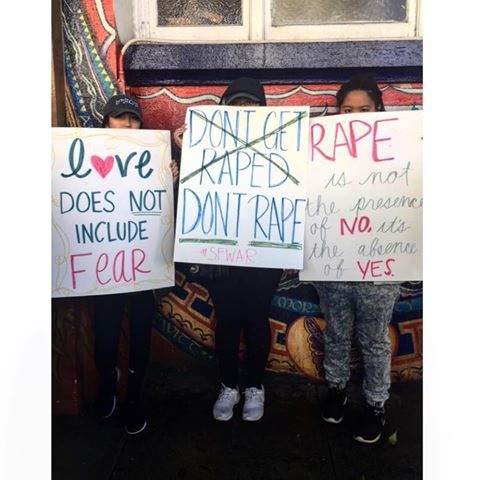I want to introduce you to Jamie – who just experienced one of the worst days of her life.
Although Jamie is not a real person, her story reflects the reality that survivors of sexual assault face in San Francisco when they decide to report the crime.

Jamie just moved to San Francisco for a new job; she’s a young woman optimistic about this next chapter in her life. She’s leaving behind a network of support in her hometown on the East Coast for a city in which she knows no one — except for a neighbor. They had bumped into each other a couple of times in the hallway and chatted, so she decided to invite him over one night to hang out and watch a movie. What was supposed to be a fun, relaxing night, turned into Jamie’s nightmare, as her neighbor violently forced himself on her and raped her.
What does Jamie do now?
Jamie is feeling an unbearable amount of shame and responsibility for what happened because she had invited her neighbor in. She feels humiliated that she could get herself into this kind of “situation.” The shame is silencing and she feels too paralyzed by the trauma to even tell her family; telling them will make what happened real.
Jamie has also had previous negative interactions with the police, which one local anti-rape activist cites as one of the reasons a survivor may not want to contact law enforcement.
Despite the weight of shame on Jamie, she is afraid. She has seen how violent her neighbor can be and is worried for her safety living next door to him, as well as the safety of others in the building. With this overwhelming fear of more violence enveloping her, Jamie decides to report the rape.
She has a couple of options.
She could call 911, but doesn’t want her neighbor to see the cops because he threatened her and told her not to call them.
She could go to a police station — and once she gets there, she will be asked to wait. And wait. And maybe wait some more. Once someone finally gets to her report, they will ask her to recount the story of her assault to a uniformed officer sitting behind a glass window. This officer will speak back to her through a loud microphone and all of the people in the area will be able to hear every word of their conversation as Jamie starts to break down.
In fact, I’ve heard of one instance in which a survivor was made to report her assault in the same space where suspects are retained.
Jamie could also go to San Francisco General Hospital, the only hospital in the city equipped to serve survivors of sexual assault, for free medical services and to report the rape. There she will have to publicly disclose at the busy Triage desk that she is a survivor of sexual assault. Once she musters up the courage to do so, she will be asked to wait in a loud, crowded ER waiting room, alone, for who knows how long.
Upon being admitted to the Rape Treatment Center, housed within San Francisco General Hospital, Jamie will be able to request a medical advocate to be with her for support during the process. She will also find out that the Rape Treatment Center nurse has to report the assault to law enforcement in some capacity whether she wanted them to or not. Although she can avoid police contact if she wants, law enforcement will have record of the incident as well as her name and contact information.
In this case, Jamie did want to contact the police; but the waiting will continue, as Sexual Violence Unit investigators from the Police Department are called to the hospital. Meanwhile, Jamie sits in a cold hospital room, regretting her decision to leave her bed that morning.
After everything she has gone through to make the initial report, Jamie won’t know what to expect next. Neither law enforcement officials, the uniformed officer from the police station, nor Sexual Violence Unit investigators at the hospital will make it clear what the process was going to look like and how long it would take. Jamie’s neighbor has not been arrested, so SVU has a large window of time in which to investigate. In fact, it can take up to six months to a year.
In the early stages of the investigation, Jamie’s investigators will most likely ask her to do a “pretext call” – that is, she’s supposed to call the man who raped her and try to get him to confess to what he did while law enforcement officials listen in on the conversation. If Jamie — terrified of talking to her neighbor — declines to make the call, her investigators will likely inform her that there will not be enough information to move forward with the case.
An insider familiar with this procedure said that in her experience the pretext call is not effective because the perpetrator usually knows what the call is about. Still, it’s a standard part of SFPD procedure.
If, despite all of this, Jamie’s case is referred to the District Attorney’s Office after being investigated, the charging DA will have to determine if they can prove a crime actually occurred — if there was collaboration, and less explicitly, if Jamie is credible.
Even if Jamie’s case moves past these hurdles, it could be years before her case goes to trial.
Meanwhile, Jamie’s anxiety is off the charts, knowing her neighbor is next door, the investigation is ongoing, and also not knowing what happens next. She wakes up almost every night with night terrors and has become fatigued by how much sleep she has lost. She can’t get out of bed in the morning, partially because of the sleep loss, but mostly because she loses her breath thinking about running into her neighbor. Because of this, Jamie’s begun to have trouble with her supervisor at work and is now on the brink of being fired with no other way of paying her rent. Falling back into old habits to deal with the trauma and to numb the pain, Jamie has begun to drink more, which has fed her suicidal thoughts. She feels unworthy of being safe and unworthy of being alive.
It should be no surprise that a lot of women like Jamie ask themselves: Working with San Francisco law enforcement to pursue legal justice was all for what?
One percent guilty verdicts
Sexual assault is a spectrum of non-consensual sexual advances ranging from verbal harassment to attempted or completed rape; one in six women and one in 33 men experience an attempted or completed rape in the course of their lives. Sexual assault is a form of sexual violence, which is a broader definition that includes domestic violence and child sexual abuse, among other forms.
In 2016, the vast majority of adult sexual assaults in San Francisco went uninvestigated or prosecuted. According to a list I generated through SF Open Data, there were 757 reports of adult sexual assault that year. When I asked the Police Department directly, the number they gave me was 694.
But even using SFPD’s number, out of the 694 reports of adult sexual assault, 297 — or 43 percent — were investigated, 91 — or 13 percent — were referred to the D.A.’s office, 11 adult and child sexual assault cases, or 1.6 percent, went to trial, and nine, or 1.3 percent, resulted in a guilty verdict. These numbers are staggering but sadly typical in terms of historical patterns and trends that persist across the country.
Sexual assault affects all of us. It’s a tool of oppression, and trauma is the lasting stain of this inequality. Trauma is like a weed that finds a way to grow into every crack of social, economic, and political life, impeding people from flourishing into their authentic, joyful selves. In the movement to end sexual assault, the first and fundamental step that we need to take is supporting survivors. It starts with helping them in their journey of healing, which for some is pursuing legal justice.
Sexual assault diminishes a person’s humanity and self-determination. When we support survivors, we need to be survivor-centered. Being survivor-centered refers to an approach to anti-rape work that prioritizes survivors’ well-being and needs, as communicated by survivors. This approach attempts to give survivors back their stolen humanity by respecting their individual choices above all else.
Nationwide, 80 percent of sexual assaults are never reported – and it’s important to support survivors whatever choice they make. As I illustrated above, they have many justifiable reasons to not want to subject themselves to this process. For those who do decide to report, we can support them by making the criminal justice system better: We can position the system to serve survivors, rather than to throw a handful of perpetrators in prison.
In theory, everyone may agree that it’s important to hold perpetrators accountable. But first, we need to prioritize supporting survivors.
Today, in the San Francisco criminal justice system and in the rest of the country, supporting survivors – acknowledging their trauma and simply respecting their time – is at odds with holding perpetrators accountable. When we push the well-being of survivors to the side and the accountability of perpetrators to the forefront we in fact become perpetrator-centered. When we support survivors in their healing process, as they indicate how they need to be supported, we create space for a survivor-led movement to end sexual assault. Survivors should be the leaders of this movement.
How do we fix this?
So what does successful reform look like in the San Francisco criminal justice system?
Successful reform should be survivor-centered — meaning that, higher reporting, arrest, and conviction rates should not be the sole measure of success. Instead, reform should be measured by how it improves the experience of survivors who chose to report and how the system impacts survivors’ healing and/or traumatization in the long run.
Of course, if we treat survivors who come forward to report with more respect, it is likely they will continue their pursuit of legal justice — and higher reporting, arrest, and conviction rates could be a result.
Living under the influence of our rape culture, which places the responsibility on survivors to get their perpetrator off the “street,” it may be hard to imagine – but we can create a survivor-centered criminal justice system here in San Francisco that puts survivors first and here is how we do it.
- Reform at San Francisco General Hospital
There are a number of practices at San Francisco General that can be improved to be more survivor-centered. We need to start by revisiting the role of Rape Treatment Center nurses as mandated reporters.
Survivors who want medical services, but don’t want to report to the police and don’t want the police to have their name, are forced into the law-enforcement system when getting the free medical care they deserve. This mandate also inhibits Rape Treatment Center nurses’ ability to be truly survivor-centered. From one local activist’s perspective, Rape Treatment Center nurses could get more information from survivors about their assault if they weren’t mandated reporters. They explain that survivors aren’t telling nurses about certain aspects of the assault during the exam, for example if their perpetrator choked them, for fear that it will be reported to law enforcement.
All health care providers in California are mandated reporters, which can be helpful at times and coercive in others — but legally linking those who provide medical services specifically to survivors of sexual assault with law enforcement is impeding the quality of these services for survivors.
The length of time it takes for medical examination and reporting at SFGH is a recurring issue for survivors. Survivors could be at the hospital for as little as two hours or as long as seven. According to one individual who has experienced this process with a survivor, the waiting around for nurses, doctors, SVU, or police, at the hospital, “…gets really hard for the survivor, they start second guessing, they get tired, and they are in the midst of processing trauma so they just want to go home.”
We need to shorten this process. The city needs to guarantee that survivors are admitted to the Rape Treatment Center within 30 minutes of arriving at the hospital and spend no longer than two hours at the RTC once they have been admitted. To meet these goals, we need more dedicated resources and specifically more staff trained to serve sexual assault survivors. With more nurses, more staff could be available to admit survivors to the RTC within this 30-minute window.
- Reform within San Francisco law enforcement
We also need to expedite the investigation process. There are 15 core Special Victims Unit investigators who are assigned to sexual assault, child sexual assault, and domestic violence, among other sex crimes. This means they have a large caseload. We need to either hire more investigators or separate out the sex crimes that investigators are assigned to. This way each investigator can focus on their sex crime, their case, and the survivor they are serving. In the short term, investigators can be more communicative with survivors about the process and the length.
Law enforcement needs to eliminate the pretext call. This tool needs to be well-documented, tracked, and eventually phased out, or at least used as sparingly as possible. It is traumatizing for survivors and its effectiveness is unknown to those outside of SVU. When I asked Lieutenant Jennifer Jackson of SVU how the pretext call is used, she responded that she could not disclose information about investigative techniques — but we need transparency around practices that greatly impact survivors like this one.
In the end, it is not new protocol that will get law enforcement officials to treat survivors with respect, but a culture of respect for survivors rooted in a survivor-centered approach to sexual assault. That will require the appointment of internal champions within law enforcement to lead the charge on shifting the culture of the organization to a survivor-centered environment. The appointment should be done in the monthly Sexual Assault Response Team meetings with input from members who witness interactions between survivors and law enforcement. SART is currently comprised of all the city agencies that respond to sexual assault and the city’s rape crisis center, San Francisco Women Against Rape, as they come together to discuss the system’s issues.
- Increase Collaboration Between Advocates for Survivors and the Homeless: Appoint a representative from an organization that supports homeless people to SART.
The intersection of sexual assault, mental health, and homelessness is undeniable. When you experience trauma like Jamie has, it affects your ability to get up in the morning, to be an effective employee and functioning member of society. In turn, trauma threatens your job stability and ultimately your housing.
Survivors need options for safe shelter. We need to appoint a representative from an organization that supports the homeless population in San Francisco to the Sexual Assault Response Team in order to coordinate the housing services survivors need. The Sexual Assault Response Team can then begin discussions, for example, around requiring a certain number of reserved beds in shelters for survivors of sexual assault. In fact, Jennifer Friedenbach, the executive director of the Coalition on Homelessness, informed me that there are currently none.
I guarantee you, you know someone who has gone through what Jamie has.
The movement to eradicate sexual assault from the face of the Earth begins with supporting Jamie and survivors like her. To bring about non-violence, we must help those afflicted with the long-term impacts of violence. Survivors deserve justice and peace. Pursuing any form of justice, and in this case legal justice, and pursuing peace, should not be at odds, but they are.
Law enforcement officials can’t promise survivors the legal justice they may be seeking — but they can guarantee that they will be treated with respect and dignity. Survivors deserve a criminal justice system that acknowledge the trauma that can threaten their well-being for a life time.
We can’t take away Jamie’s trauma – but we can make her pursuit of legal justice a peaceful one. And adopting survivor-centered practices will be a good start.
Bianca Rosen received her Masters In Public Affairs from the University of San Francisco this spring. This article is adapted from her Capstone thesis.



